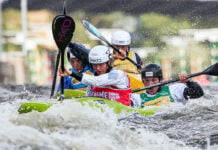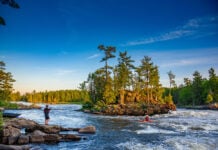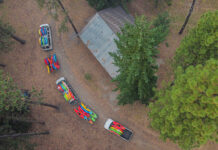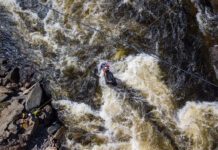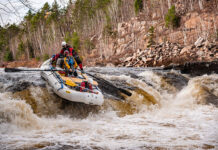One of the most influential essays ever written on outdoor education came to me as a grey and blurry photocopy, perhaps 30 times removed from its original copy. It lived in my ammo box for nearly a decade, folded in half and softened from handling to an almost cloth-like texture. I too photocopied it and handed it along many times over. It was formative in my understanding of my leadership and guiding role on the river.
This essay, written in 1980 by Outward Bound mountain instructor Thomas James, is philosophically titled, “Can the mountains speak for themselves?”
The paper is less esoteric than it sounds— it specifically debates what role instructors have in verbalizing for their students what it is that they are learning, in this case, from their time in the mountains. The parallels to the river world are immediate.
On one side of the debate is the position that we, as leaders facilitating these experiences, need to say very little, as time on the river or in the mountains presents life lessons well beyond the concrete experience at hand that are available for anyone who cares to learn them. Challenge, perseverance, confronting fear, pride in learn- ing new skills—the list goes on and on. Paddling works well as a vehicle for learning, and the solo nature of kayaking in particular, brings up important questions.
On the other side are the interpreters, who believe that making these lessons obvious—explaining the deeper meaning of experience and encouraging reflection—is required in order for participants to take home the learning. As James points out in his essay, both sides are right, and both have a place. The question then becomes, when and where is each appropriate?
Having made my living taking people down rivers, either for their vacation, to learn to paddle, to see wild places or to get a glimpse of what is inside of themselves, I can say I’ve seen and tried all variations on the ‘who speaks for what’ debate.
Typically, we paddlers are less philosophical than our mountain-going cousins, which I believe is due to the immensely immersive nature of running whitewater.
The river speaks loudly and forcefully to even the most temporary of visitors on just a half-day raft trip. Spend two or three weeks on a northern river or in a canyon and its language becomes not only forceful, but crystal clear.
The clarity of the rivers’ message is the point worth examining for us river people, and it is here where I decide on my role as interpreter or none.

The half-day rafters often get blasted with the greatest hits of what whitewater has to offer, but it is written in a foreign language. It is loud, fun, but not understood in any way. I don’t even try to inter- pret what the river says for these folks; it would come across as stilted and unintelligible. I believe my obligation in this case is to make a plug for clean, free-flowing rivers, but that’s about it.
As for the expedition paddlers, on the other hand, I don’t need to interpret for them. They have all the time they need to figure out what the river is saying, or not saying, to them.
It is the in-between group that is more challenging. Spend more than a couple of days around whitewater—become more than a visitor—and one senses that there is more going on than waves and thrills.
I saw this in the five-day kayak school world where I spent several summers. By the end of the week, introspective individ- uals sense that their experience is deeper than learning to roll and running class II. There was current, continuity, and a forum to ask themselves questions about what is important to them. Even here I do not see it as my job to tell the whole story. Rather than interpreter, I see my role as more of a coach—helping people discover for themselves what the river experience means to them.
As enthusiasts, we have either con- sciously or unconsciously figured this out. It is what keeps us coming back to feel the pull of the current. For those on the verge of understanding, sensing there is more out there, I open my ammo box and hand them a photocopy.
Jeff Jackson is a professor with Algonquin College’s Outdoor Adventure guide training diploma and is the co-author of Managing Risk: Systems Planning for Outdoor Adventure Programs.
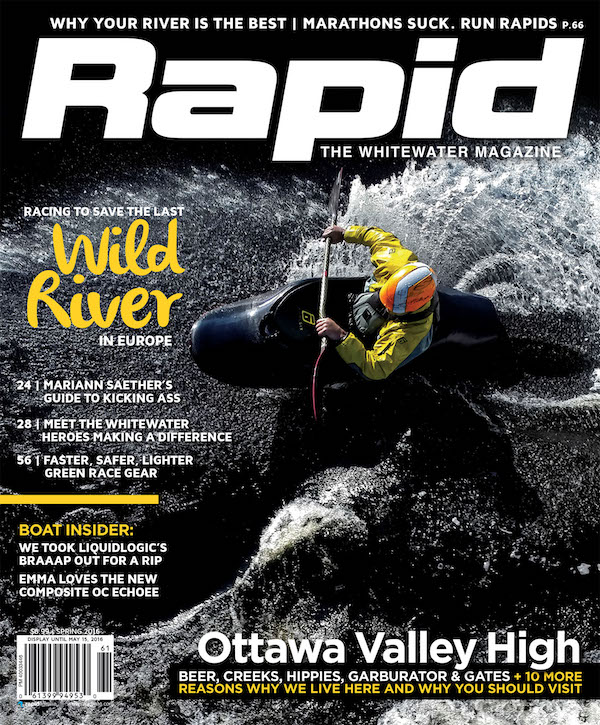
Subscribe to Paddling Magazine and get 25 years of digital magazine archives including our legacy titles: Rapid, Adventure Kayak and Canoeroots.



